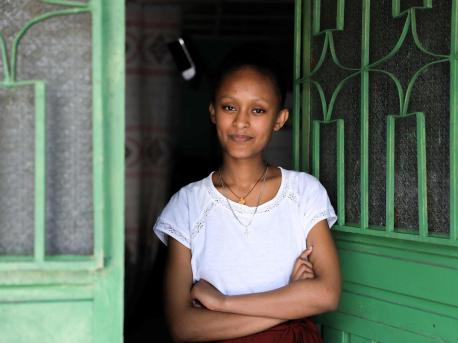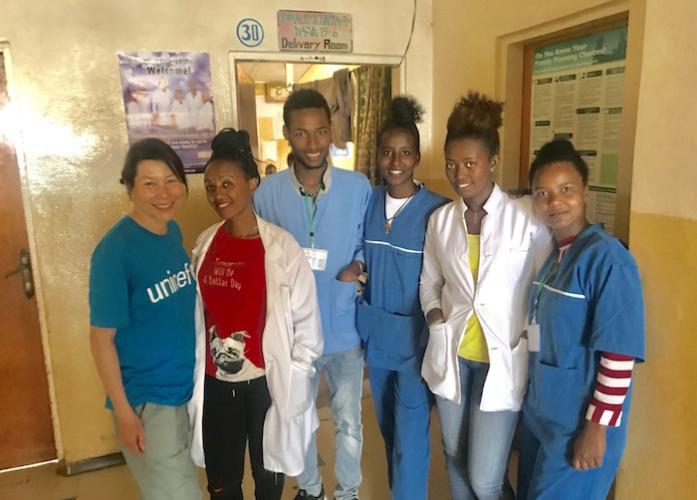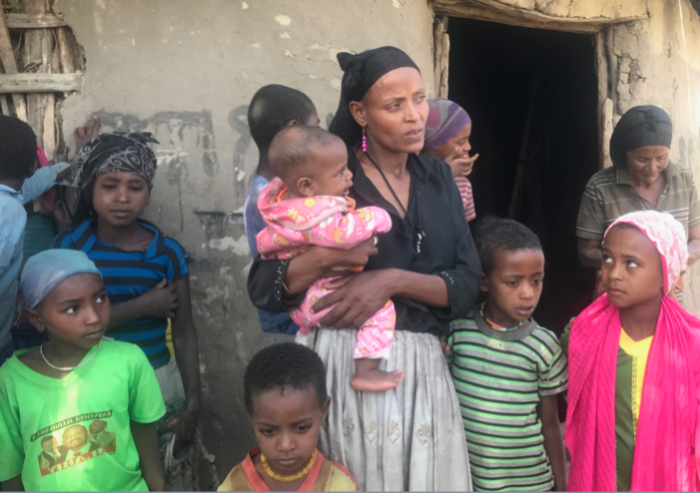
Education, Not Marriage: Building Better Futures for Girls in Ethiopia
UNICEF programs help reduce child marriage in Ethiopia by keeping girls learning and giving them the support they need to survive and thrive during the COVID-19 pandemic.
To the 2020 graduating class of Wolaita Sodo University in Ethiopia — and particularly to Meron, the archaeology and heritage management student whom I met one year ago as part of a UNICEF field visit — you inspire me.
WSU is a public university with 35,000 students, mostly from Ethiopia, Eritrea, Djibouti and other neighboring countries. I spent a day with students there discussing gender-based violence, women's empowerment issues and their future. The ambition of these students would rival those of any world-class university, yet it was their resilience that inspired me most.
Ethiopia is home to 15 million child brides
Ethiopia is home to 15 million child brides; the country has one of the world's highest rates of early marriage. Four in ten girls in Ethiopia marry before their 18th birthday; the majority of them give birth while still in adolescence. Ninety percent of these girls will never go to school, much less attend university. They are far less likely to have access to basic health services and financial institutions and are more likely to justify wife beating and other disempowering behaviors to their peers.

At Gidole Hospital in Southern Ethiopia, Robin Kim (far left) met with with clinicians and midwives on a two-month training program. A nearby sign in the maternity living area reads, "Because no mother should die while giving birth." © Photo courtesy of Robin Kim
School closures caused by COVID-19 quarantines have disrupted more than education, although that alone is a major challenge in a country where only 15 percent of the population has access to the internet, making online education impossible for most. School meals provide vital nutrition for millions of children. Schools are also safe harbors, since teachers who are trained by UNICEF are often the first to identify signs of abuse. Teachers have far less access to students while schools are closed during the pandemic, and many child protection agencies have cut back or eliminated home visits to prevent the spread of the novel coronavirus. In northern Ethiopia, 500 girls have been rescued from child marriage since schools closed in mid-March, sending 26 million children home.
Higher education in Ethiopia is primarily limited to young men from financially well-off households. Women make up only 33 percent of all college students in the country. Just 8.2 percent of Ethiopian students enroll in college, a rate far below that of other East African countries and world averages.
"There's a lot of pressure to get married before completing school," says Meron, a recent college graduate. "But I'm here to finish my studies, get a job and contribute to my country. We are all here to take our place, one by one."
Against all odds are young women like Meron. "Gender discrimination is one of the biggest factors in perceptions of what it means for a girl to take care of herself," she told me as we sat with a group of students in her dormitory. "It's not easy for most of us. There's a lot of pressure to get married before completing school... but I'm here to finish my studies, get a job and contribute to my country. We are all here to take our place, one by one."
It's a huge achievement for many in the class of 2020, whether it's women at WSU or any of the 1.6 billion children unable to attend school in person during the pandemic. In-person graduation ceremonies are not an option this year — but for Meron and many others, just graduating is important.

UNICEF's social cash transfer program makes it possible for this mother in Halaba, Ethiopia to enjoy paid maternity leave and keep her three school-aged children in school. Without it, she said that she and her children would be at work building roads and carrying stones. © Photo courtesy of Robin Kim
Meron has other reasons to be optimistic. Her archaeology ambitions are poised to benefit a country that is home to nine UNESCO World Heritage sites, including Awash Valley, where the skeleton of Lucy, the hominid who lived more than 3 million years ago, was discovered, the ruins of the ancient city of Aksum, one of the oldest continually inhabited places in Africa, and the 13th-century rock-hewn churches of Lalibela. Ethiopia's history is essential for understanding human history. Meron's long-game aspirations will benefit us all.
There are additional bright spots. UNICEF has been making strides to end child marriage by empowering girls. UNICEF continues to be the world's biggest purchasers of lifesaving vaccines for children, and has secured more than $1.5 million in supplies for Ethiopia. The country has also made remarkable progress in education, both in increasing enrollment and encouraging quality of instruction beyond urban and affluent areas.
Economic hardship caused by the pandemic threatens to reverse decades of progress in the fight against child marriage
Fears are mounting that the pandemic is reversing years of work to prevent girls under age 18 from marrying. The U.N. predicts there could be an extra 13 million child marriages by 2030 as COVID hits household incomes. Visits to health care centers have also declined due to lockdowns, potentially resulting in more maternal and child deaths in low- and middle-income countries. Millions of children are in danger of missing out on lifesaving vaccines against measles, diphtheria and polio. According to Robin Nandy, UNICEF's Principal Adviser and Chief of Immunization, "WIth disruptions in immunization services due to the COVID-19 pandemic, the fates of millions of young lives hang in the balance."
When children suffer, we all do — and when they thrive so does the future of humanity. To graduates everywhere, and to Meron, we walk down that virtual aisle with you.
Robin Kim is Chairman of the UNICEF USA Northwest Regional Board.
Top photo: While schools are closed in Addis Ababa, Ethiopia to prevent the spread of COVID-19, 17-year-old Sehinemariam and her five siblings are continuing their educations from home via TV and radio using a distance learning plan developed by the government with support from UNICEF. © UNICEF/UNI337377/Tesfaye


